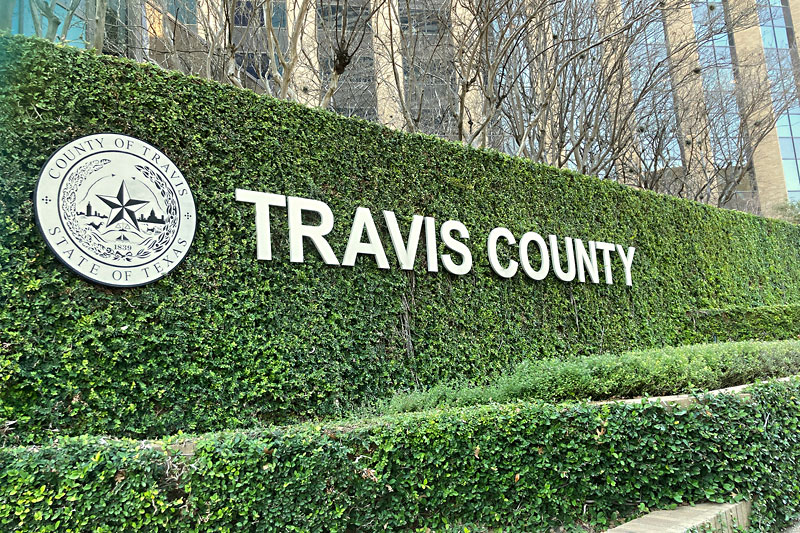Nearly a Dozen Contested Races on the Election Docket
Judging the judges
By Brant Bingamon, Fri., Feb. 18, 2022
How many local judicial races will Travis County Democrats see on their primary ballot? Twenty in all: countywide contests for half of the civil and criminal district courts (10), most of the courts at law (7), and the probate court, plus one of the county's five justices of the peace (each serves in a separate district) and a spot on the 3rd Court of Appeals. Only two of these winners (one of the civil district courts and the 3CA race) will go on to face GOP opponents in November. Ten seats are uncontested in this primary, nine held by incumbents.
That's all familiar terrain for regular primary voters, but 2022 sees a substantial increase in contested judicial primaries – 11 (including two JP spots), compared to six in 2018 when these same seats were last up. Our conversations with the judicial candidates highlighted some through lines that have carried forward the last few years of Travis County's reckoning with the need for reform: restorative justice, pretrial diversions, support and services for both defendants and victims/survivors. These ideas are woven throughout the pitches of the diverse, progressive, and community-obsessed candidates we've talked to, who are looking at the entire courthouse docket – civil and criminal, felony and misdemeanor, small and large claims, down to truancy and eviction orders – through an ever-sharper equity lens.
County Courts at Law
For example, look at the race for County Court at Law No. 4, the specialized misdemeanor court for family violence cases. Its creator, Mike Denton, vacated the bench two years ago in his unsuccessful bid for Travis County attorney; Dimple Malhotra, who faced two opponents in the 2020 primary to finish Denton's term, is widely respected for her 23 years of advocacy for victims of domestic violence – except by some in the defense bar who appear in that court.
Her challenger this time, criminal defense attorney Jana Ortega, says she can increase pretrial diversion in CCL4 and reflects back the angst over Malhotra, going so far as to tell us, "A defendant cannot get a fair trial in this court." Malhotra responded that this rather strong charge was "a blatant lie" and pointed to two diversion programs she uses in CCL4: the Phoenix Court program created under Denton for sex workers charged with prostitution, and a family violence intervention program launched last year by Delia Garza, who won the 2020 race for C.A.
There are several other CCLs, along with Malhotra's, that provide specialized adjudication for offenses where treatment can replace punishment. Over at CCL5, the docket includes many DWI cases (as do several others; CCL7, whose Judge Elisabeth Earle is running unopposed, hosts a formal DWI diversion program for those seeking sobriety). For many years under Wilfred Aguilar and Nancy Hohengarten, CCL5 focused on mental health issues and offered misdemeanor defendants the opportunity to seek treatment, stabilize their conditions, and have their cases dismissed.
Tanisa Jeffers, who ran against Malhotra two years ago, would like to restore the mental health docket to CCL5; she's a deeply experienced defense attorney and associate judge of Austin's municipal court and hopes to also establish drug and gun violence programs in CCL5. "I was one of the first judges to routinely order the surrender of all firearms in our assault family violence cases," Jeffers said. "Judge Malhotra has continued that trend and she and I will work hand in hand." (Cases involving family members who aren't intimate partners are being handled in all the CCLs, part of Malhotra's efforts to reduce her court's backlog of cases, which was a major issue in the 2020 race.)
Jeffers' opponent Mary Ann Espiritu, meanwhile, wants to drill down more into DWI adjudication, which plays to her strength as one of the city's top DWI defense attorneys, and which she notes is an arena that hasn't been a focus of many justice reformers. "I know what's working right now, I know what I would change as far as the mechanics of the court, I know what I would keep," she said.
Perhaps the most successful diversion program in the county is Project Engage, the youthful-offender program created by outgoing CCL6 Judge Brandy Mueller, who after three terms is seeking the 403rd District Court bench. Project Engage helps 17- to 19-year-olds charged with nonviolent offenses get dismissals and expunctions if they complete its requirements, including staying in school or keeping a job and checking in monthly with the court.
There are two women running to replace Mueller in CCL6. Denise Hernandez, currently working in the C.A.'s Office with survivors of abuse, wants to expand Project Engage. A daughter of farmworkers, Hernandez says her run is about "honoring people's experience, honoring their trauma." Her opponent, defense attorney Leslie Boykin, also wants to increase participation in Project Engage, for which 1,500 offenders in the system are eligible right now, more than have gone through the program since Mueller created it a decade ago. Boykin would also like to offer participants free expunctions of their arrest records, something that usually costs around $2,500.
District Courts
Travis County's longest-serving civil and criminal district judges – Lora Livingston and Brenda Kennedy, who oversee other judges on their respective sides of the docket – are both Black women and are both retiring this year. And both races to succeed them have included awareness that representation matters even as they've largely turned on other factors.
Mueller is running to succeed Kennedy in the 403rd DC, saying she wants to continue her work in CCL6 with a larger pool of youthful felony defendants. Her opponent Craig Moore, a lead prosecutor in the District Attorney's Office, is also committed to diversion, has handled many cases in the 403rd, and says it's important for a judge to be able to reach young people, whatever the circumstances. "Lots of young people just want to plead" and get their cases over with, he told us, "but they fail to realize that it will have lifelong consequences."
The civil district courts, including the 261st DC where Livingston has held the bench since 1999, handle a wide range of cases, including the steady stream of litigation to overturn decisions by state and local government, but spend much of their time (about 60% in this term) handling family law matters. Like Livingston, Pam Davis is a family law expert, having litigated hundreds of divorces, adoptions, and more in her 23-year career. She wants to establish a free divorce clinic at the 261st DC so people may file for divorce without having to hire a lawyer. Her opponent, Daniella Deseta Lyttle, is a Brazilian immigrant who joined the U.S. Army as a combat medic, then became an immigration and family law attorney with the goal of helping families stay together. She notes that of the county's 10 civil district judges, only one is bilingual; she wants to make forms and documents available in Spanish and other languages.
Back on the criminal side, the 331st District Court features a rare challenge to an incumbent, Chantal Eldridge, who represented indigent clients as a criminal defense attorney for many years before taking the bench in 2019 and who, like Malhotra, faces criticism from the other side of the bar. "When I walked in, we had a big docket," Eldridge said, with "people sitting in jail for years" awaiting trial. She's sped up proceedings and reduced the backlog, and would like to find better ways to address higher-level drug offenses now that small-scale possession has been effectively decriminalized in Austin.
Her challenger Jessica Huynh, daughter of Vietnamese refugees, currently works in the D.A.'s Office on child abuse cases. As in other judicial races that pit prosecutors against defenders, Huynh believes the 331st needs "a complete mind shift"; she told us the most important quality for a judge is empathy. "You want judges to recognize that humanity exists in every single case," she said, "and show compassion and not reduce people to statistics and policies."
The other two contested district court races are for the 419th and 455th, both civil courts. We reported last week on the bizarro contest in the former, where incumbent Catherine Mauzy is being challenged by a different incumbent civil judge who's only halfway through her first term, Madeleine Connor, whom Mauzy (as well as federal Judge James Nowlin) dubbed a "vexatious litigant" for her lengthy legal harassment of her neighbors and now, apparently, of Mauzy.
The 455th is a newly created court, and as such is currently held by a GOP appointee of Gov. Greg Abbott, Cleve Doty, who is running to keep the seat in November. He's almost certain to face (and lose to) lifelong LGBTQIA rights advocate Laurie Eiserloh, who ran a strong race for C.A. two years ago against Delia Garza and has vastly greater name-ID and voter support than her opponent Eugene Clayborn, a career attorney in the Office of the Attorney General's Natural Resources Division.
3rd Court of Appeals
The only three-way contest on the judicial ballot is for Place 4 on the 3rd Court of Appeals, the most liberal of the state's 14 intermediate appellate courts, elected mostly by Austin-area voters; the other four seats on 3CA have all flipped to the Ds in the last two election cycles, and three experienced progressives – Beth Payán, Paula Knippa, and Rosa Lopez Theofanis – are running for this seat.
Payán currently leads diversion programs at the D.A.'s Office and has deep experience as a community advocate. Knippa is an expert in the many varieties of civil law, a single mom, and also, appropriately enough, a Scorpio. Theofanis said she loves doing appeals and spoke about her work contesting the dismissal of manslaughter charges against Austin police Officer Charles "Trey" Kleinert for the 2013 killing of Larry Jackson, a unarmed Black man Kleinert shot in the neck after pursuing him on foot, then commandeering a bystander's car, then tackling him as he walked away from the scene of an earlier bank robbery.
Kleinert beat this rap by citing his participation in a multiagency task force that made him, at the moment of Jackson's killing, a federal officer not subject to local prosecution, despite carrying an APD badge and weapon. Theofanis called the case – which she fought all the way to the U.S. Supreme Court – the most fascinating and heartbreaking of her career. "Fighting the good fight is extremely important," she said, "and sometimes you win the good fight. And hopefully we will win good fights as progressives in our community."
The Local Judicial Races
261st DC: Pam Davis, Daniella Lyttle
331st DC: Chantal Eldridge*, Jessica Huynh
403rd DC: Brandy Mueller, Craig Moore
419th DC: Catherine Mauzy*, Madeleine Connor
455th DC: Laurie Eiserloh, Eugene Clayborn
CCL4: Dimple Malhotra*, Jana Ortega
CCL5: Tanisa Jeffers, Mary Ann Espiritu
CCL6: Leslie J. Boykin, Denise Hernandez
JP, Pct. 1: Yvonne Williams*, Andrew Hairston
JP, Pct. 5: Nick Chu*, Cassie Malone
3rd Court of Appeals: Rosa Lopez Theofanis, Paula Knippa, Beth Payán
UNCONTESTED:
147th DC: Cliff Brown*
201st DC: Amy Clark Meachum*
250th DC: Karin Crump*
299th DC: Karen Sage*
459th DC: Maya Guerra Gamble*
CCL1: Todd Wong*
CCL2: Eric Shepperd*
CCL3: Bianca Garcia
CCL7: Elisabeth Earle*
JP, Pct. 2: Randall Slagle*
JP, Pct. 3: Sylvia Holmes*
JP, Pct. 4: Raúl González*
Probate Court Judge: Guy Herman*
Got something to say on the subject? Send a letter to the editor.









